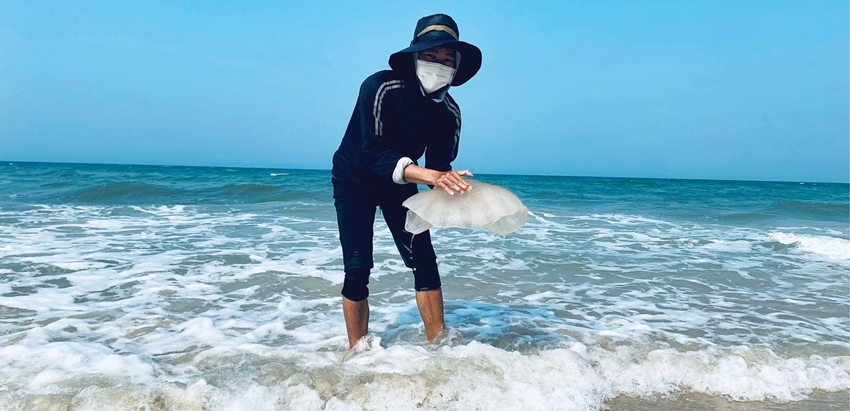 |
| The jellyfish season will last until the end of March of lunar year |
According to Mr. Cu, an experienced fisherman in Giang Hai commune (Phu Loc), typically, when setting nets to catch fish, fishermen often unintentionally catch jellyfish as well. “But because their value is not very high, my boat is not particularly interested in this type of seafood. Depending on the water conditions each year, from January to the end of March of lunar year, jellyfish will be abundant. If the sea is rough, the jellyfish will usually be washed ashore by the waves,” Mr. Cu said.
For many years till now, Mr. Trung, a beachgoer at Giang Hai commune beach, has been accustomed to collecting jellyfish. He said: “Every early summer, I always combine swimming in the sea with strolling along the beach. In the past two years, every time I went, I collected jellyfish. I hope that this year I will also be lucky to find jellyfish to bring home for my family to enjoy.’’
Sharing the joy of the jellyfish season like Mr. Trung, but for Mr. Hai (Phu Loc), in order to increase his chances of encountering jellyfish, he has been willing to “invest” both effort and time. During his free time, he often rides his motorbike along the coast from the beach of Vinh My commune to that of near Ham Rong beach (Vinh Hien commune). In areas where he can't ride his bike, he walks while observing the water's edge.
Mr. Hai shared: “On windy days with big waves, especially in the early morning and evening, jellyfish would be often washed ashore. Some days I could not collect anything, while other days I manage to pick up 4-5 jellyfish.”
Edible jellyfish found in the sea come in various sizes, ranging from as small as a lid to over half a meter in diameter. Compared to previous years, the amount of jellyfish washed ashore this year is quite low, reducing the chances for those who enjoy collecting them. However, this doesn't diminish the appeal of this seafood.
Jellyfish are often very slippery and can cause itching. Additionally, they tend to accumulate a lot of sand. Therefore, those who collect jellyfish often have to learn how to pick and process them to ensure hygiene. At the beaches, gunny bags are a very useful tool that jellyfish collectors often prefer because they can avoid sand, allow seawater and jellyfish slime to flow out. This is also the easiest way to identify those who are passionate about gifts from the sea.
Mr. Hai added: “Jellyfish that were washed up onto the sandy beach are harder to process because they are covered in a lot of sand. But with jellyfish floating near the water's edge, I usually pick them up right away and put them into a bag. This type of jellyfish is cleaner from sand, making it easier to preliminarily prepare.”
Not only does collecting jellyfish bring joy, but it also provides a significant additional income for Mr. Hai. He said: “Currently, at fish markets, the price of jellyfish remains stable, ranging from 5 to 15 thousand dong per kilogram, depending on whether it's the body or the tentacles. If I'm lucky on any given day, I can still earn hundreds of thousands from collecting jellyfish. It provides delicious food for my family and extra money. For me, jellyfish truly represent the 'sea’s luck'.”
Despite being from a family with a fishing tradition, for a long time, Mr. Hai's family hasn't gone to sea with fellow fishermen. With improved life quality, Mr. Hai and many other locals have more professions to choose. However, for him, more than just income, collecting jellyfish brings another kind of joy.
He reminisced, "I always remember the memories from my childhood. Those were the nights when boats came to the shore, the whole neighborhood prepared their baskets and oil lamps, waiting. My mother and I would sit on the shore, eagerly waiting for my father to return. Then there was the excitement when the sea was abundant, the nets full of shrimp, fish, jellyfish, and squid. That's why I am so happy when I get to collect jellyfish; it feels like I'm reliving those days when my mother was still around."
Every day, many people like Mr. Trung and Mr. Hai are still actively searching for jellyfish on the coastline. Not only because jellyfish are gifts from the sea, but also because the season of this heavenly bounty will only last for almost another month.